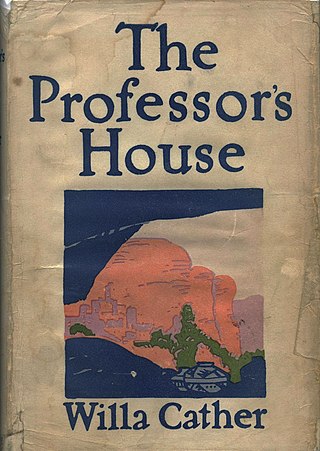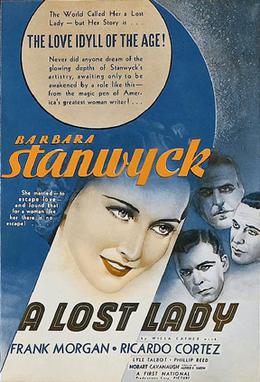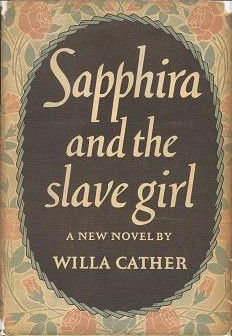Related Research Articles

Willa Sibert Cather was an American writer known for her novels of life on the Great Plains, including O Pioneers!, The Song of the Lark, and My Ántonia. In 1923, she was awarded the Pulitzer Prize for One of Ours, a novel set during World War I.

My Ántonia is a novel published in 1918 by American writer Willa Cather, which is considered one of her best works.

O Pioneers! is a 1913 novel by American author Willa Cather, written while she was living in New York. It was her second published novel. The title is a reference to a poem by Walt Whitman entitled "Pioneers! O Pioneers!" from Leaves of Grass (1855).

One of Ours is a 1922 novel by Willa Cather that won the 1923 Pulitzer Prize for the Novel. It tells the story of the life of Claude Wheeler, a Nebraska native in the first decades of the 20th century. The son of a successful farmer and an intensely pious mother, he is guaranteed a comfortable livelihood. Nevertheless, Wheeler views himself as a victim of his father's success and his own inexplicable malaise.

The Professor's House is a novel by American novelist Willa Cather. Published in 1925, the novel was written over several years. Cather first wrote the centerpiece, “Tom Outland's Story,” and then later wrote the two framing chapters “The Family” and “The Professor.”
"Paul's Case" is a short story by Willa Cather. It was first published in McClure's Magazine in 1905 under the title "Paul's Case: A Study in Temperament", which was later shortened. It also appeared in a collection of Cather's stories, The Troll Garden (1905). For many years "Paul's Case" was the only one of her stories that Cather allowed to be anthologized.
Peter is a short story by Willa Cather. It was first published in The Mahogany Tree in 1892.
The Burglar's Christmas is a short story by Willa Cather. It was first published in Home Monthly in 1896 under the pseudonym of Elizabeth L. Seymour, her cousin's name.
El Dorado: A Kansas Recessional is a short story by Willa Cather. It was first published in New England Magazine in June 1901.
Jack-a-Boy is a short story by Willa Cather. It was first published in Saturday Evening Post in March 1901.
"Coming, Eden Bower!" is a short story by Willa Cather. It was first published in Smart Set in August 1920, and it was republished in Youth and the Bright Medusa under the title of Coming, Aphrodite, with minor alterations.
The Bohemian Girl is a short story by Willa Cather. It was written when Cather was living in Cherry Valley, New York, with Isabelle McClung whilst Alexander's Bridge was being serialised in McClure's. It was first published in McClure's in August 1912.
"The Profile" is a short story by Willa Cather. It was first published in McClure's in June 1907.
The Namesake is a short story by Willa Cather. It was first published in McClure's in March 1907.
Flavia and Her Artists is a short story by American writer Willa Cather. It was first published in The Troll Garden in 1905.
The Garden Lodge is a short story by Willa Cather. It was first published in The Troll Garden in 1905

My Mortal Enemy is the eighth novel by American author Willa Cather. It was first published in 1926.

A Lost Lady is a 1934 American drama film directed by Alfred E. Green and starring Barbara Stanwyck, Frank Morgan, and Ricardo Cortez. Based on the 1923 novel A Lost Lady by Willa Cather, with a screenplay by Gene Markey and Kathryn Scola, the film is about a woman whose fiancé is murdered by his mistress' husband two days before their wedding. Her uncle sends her away to the mountains, where she meets a man who looks after her and eventually proposes. She accepts even though she does not love him.

Sapphira and the Slave Girl is Willa Cather's last novel, published in 1940. It is the story of Sapphira Dodderidge Colbert, a bitter white woman, who becomes irrationally jealous of Nancy, a beautiful young slave. The book balances an atmospheric portrait of antebellum Virginia against an unblinking view of the lives of Sapphira's slaves.
The Elopement of Allen Poole is a short story by Willa Cather, first published in 1893 by The Hesperian while she was a student. The story itself deals with the character of Allen Poole, who is shot by an officer on the night of his elopement with his partner, Nell.
References
- ↑ Willa Cather's Collected Short Fiction, University of Nebraska Press; Rev Ed edition, 1 Nov 1970, page 540